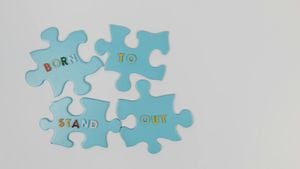Iran’s nuclear ambitions are once again drawing attention, as the nation has reportedly ramped up its uranium enrichment amid mounting international pressure. The recent developments come just as diplomats prepare for another round of discussions at the International Atomic Energy Agency (IAEA) board meeting, where Western powers, including France, Germany, and the United Kingdom, have tabled new censure motions against Iran.
On October 26, just days before the IAEA meeting, Iran was reported to have increased its stockpile of uranium enriched to 60%, hovering ominously close to weapon-grade levels. According to confidential IAEA reports obtained by various news agencies, Iran's stockpile rose to approximately 401.9 pounds of 60%-enriched uranium, marking an increase of 38.8 pounds since the last report released by the agency earlier this fall. This level of enrichment is only a short technical step away from the 90% purity required for nuclear weapons.
The IAEA's overall assessment of Iran's enriched uranium stockpile now stands at around 14,560 pounds, which is up by nearly 1,880 pounds since August this year—a significant increase. Under the terms of the 2015 nuclear deal, Iran was allowed to enrich uranium only up to 3.67% purity and maintain a stockpile not exceeding 300 kilograms.
These findings come against the backdrop of increased tensions not just with Western nations, but also regionally as Israel and Iran have exchanged missile strikes amid the conflict engulfing Gaza, where Hamas, with Iran's backing, continues to engage Israeli forces. The situation has potential ramifications for Iran's nuclear framework, especially considering the rocky history of relations with the United States, especially under the administration of former President Trump, who had opted to withdraw from the nuclear deal and impose severe sanctions on Iran.
Responding to the looming censure resolution, Iranian officials, including Foreign Minister Abbas Araghchi, have reaffirmed their stance and indicated they would view the passing of such resolutions as unfriendly acts. They warned of proportional responses to any attempts to escalate tensions through additional sanctions or measures at the IAEA meeting.
During a recent meeting between Araghchi and IAEA Director General Rafael Mariano Grossi, Iran reportedly offered to halt its increases of enriched uranium but emphasized this commitment depended partly on the Western powers abandoning their proposals for new resolutions against Iran. The Iranian perspective is increasingly framed by what they perceive as unjust pressure tactics being exerted by European powers, which are now coming together to find faults with Iran's nuclear compliance.
"This move by the E3 is not conducive to keeping the positive atmosphere surrounding our engagements with the agency,” Araghchi warned. He stressed the necessity of constructive dialogue over confrontational approaches, noting the previous success of Iran and the IAEA when both sides cooperated more openly.
While the IAEA recently suggested Iran has implemented some preparatory measures aimed at halting the expansion of its stockpile of high-grade uranium, there is growing skepticism about Iran’s intentions. Many Western diplomats remain unconvinced, citing Iran's history of non-compliance and secretive enrichment practices.
Meanwhile, reports indicate Iran has amassed enough fissile material to theoretically create several nuclear weapons, though officials maintain their program is entirely peaceful and intended for civilian use. The IAEA continues to monitor the situation closely, reaffirming its commitment to verifying Iran's nuclear activities through inspections, which have been met with various levels of resistance from Iranian authorities.
Yet, as the geopolitical chess game continues, certain analysts are concerned about Tehran's warning against non-compliance issues. Grossi has raised alarms about the possibility of Iran reversing its current nuclear doctrine should it find itself threatened by foreign adversaries, especially as military rhetoric against Iran intensifies from both Israel and other nations.
The diplomatic maneuvering at the IAEA reflects broader tensions within the Middle East, especially as wars rage not only between Israel and Hamas but also involving Russian and Western interests elsewhere—most critically the situation surrounding Ukraine. With external pressures mounting, the ability for Iran to balance its nuclear aspirations with international demands remains precarious.
Iran's nuclear program continues to be at the center of global scrutiny, but Tehran warns it may adopt more assertive stances if it perceives threats to its existence. With all eyes on Vienna and as resolutions are likely to be debated, the ramifications of the decisions made at this meeting could influence not just Iran's nuclear future but the geopolitics of the entire Middle East.



